During the summer of 1933, while Bonnie Parker & Clyde Barrow were on the lam in the midwest, Los Angeles newlyweds Burmah White, a nineteen year old hairdresser and her husband twenty-eight year old Thomas, an ex-con, were also on the run.
Most newlyweds don’t spend their honeymoon on a crime spree, but Burmah and Thomas were not most newlyweds.
The lovebirds perpetrated ten stick-ups – seven in a single evening (netting them about $220); but the worst of their crimes was the shooting of a popular elementary school teacher, Cora Withington, and a former publisher, Crombie Allen.
Crombie was teaching Cora how to drive his new car. They were stopped at a light when a car driven by a young blonde woman pulled up alongside them, and a man brandishing a gun jumped out of the vehicle. The bandit pointed his weapon at Cora’s head and said: “Shell out, sweetheart; and that goes for you, too, bo.” Just as Cora and Crombie were handing over their valuables there was an explosion – it was a gunshot – and it tore through Miss Withington’s left eye, came out near the right eye and ripped a hole in Allen’s neck. Despite his injury, Allen memorized the license plate number of the bandit’s car!
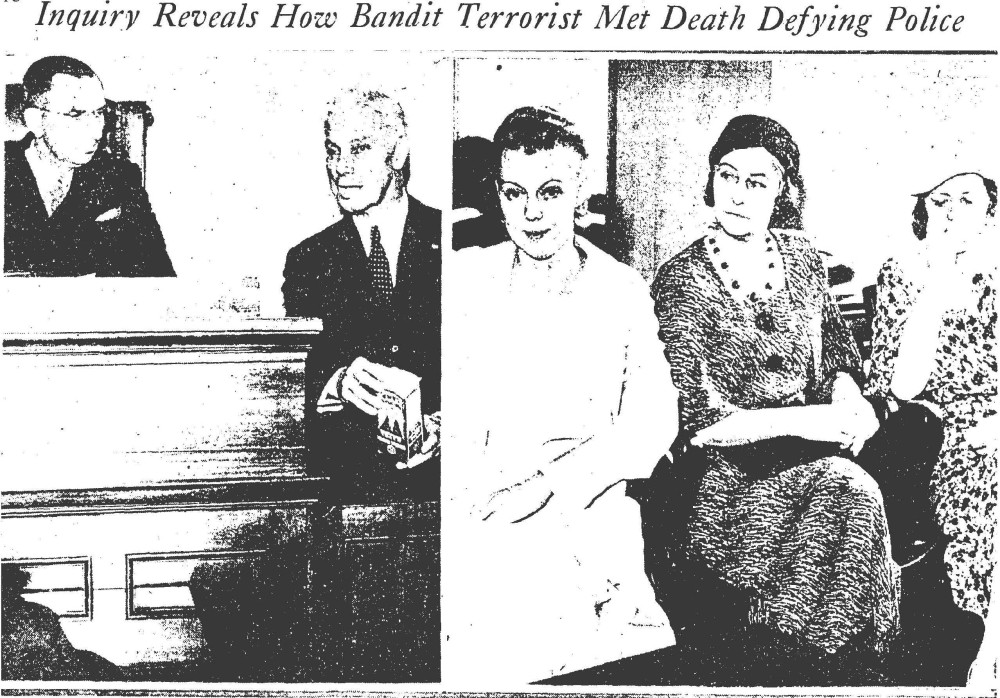
Left: Crombie Allen, retired publisher (right) testifying before Deputy Coroner Montfort at the inquest. Allen identified White as the man who robbed him and Miss Cora Withington, shooting the latter. He could not identify Mrs. White. Right–Mrs. Burmah White, widow of the dead bandit; Policewoman Lula Lane, and Mrs. Violet Dillon, sister of the dead man, at the inquest.
Both victims would survive their gunshot wounds, but the schoolteacher would be permanently blinded.
Chief of Police James Davis immediately instituted a blockade in an attempt to snare the bandits.
The blockade consisted of random stops and searches of pedestrians and vehicles, particularly during the wee hours of the morning when, according to Davis, “the more callous criminals are abroad.”
Chief “Two Gun” Davis wasn’t a big fan of the 4th Amendment. He’d said that constitutional rights were of “no benefit to anybody but crooks and criminals.”
Davis would use a similar blockade strategy later, in 1936, in an attempt to stem the tide of Dust Bowl refugees from Oklahoma, Texas, Missouri, and Arkansas.
Whatever his shortcomings, Davis wasn’t wrong about callous criminals working in the city – they appeared to be everywhere. Masked robbers broke into the home of a cop and robbed him at gunpoint; while across town a woman in her 50s held up a rooming house manager who was showing her an apartment.
While the LAPD continued to hunt the Whites, teachers and parents at the Third Street School established a fund to aid Cora Withington, who would not be able to return to teaching because of her injuries.
Things would end badly for the newlyweds.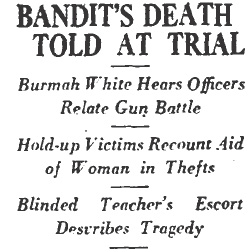
The cops located their car in a parking lot adjacent to an apartment at 236 S. Coronado Street. An officer dressed in a mechanic’s uniform staked out the vehicle and watched as Burmah got into it and drove it into a garage while her husband held the door open for her. Two officers entered the hallway of the apartment and confronted Thomas White, who made the mistake of attempting to shoot it out rather than surrender. He died after taking two bullets through his heart.
While Thomas White was dropping to the floor dead, Burmah was on another floor attempting either to commit suicide or escape by hurling herself out of a window. Police grabbed her before she could jump and took her to jail.
Burmah’s lack of remorse and abrasive demeanor earned the nineteen year old widow a guilty conviction on eleven felony counts and she was sentenced to a term of from 30 years to life.
At her sentencing Judge Bowron said that Burmah had been “an accomplice in the heartless and wanton shooting of Miss Withington and Crombie Allen”, and that her deliberate intent demonstrated how “utterly abandoned and ruthless she is despite her years”.
Burmah began serving her time at San Quentin, but was ultimately transferred to the Women’s Prison at Tehachapi. Herald-Express reporter, Agness “Aggie” Underwood, interviewed Burmah in prison and described her as “slightly defiant, cynical, and egotistical”. A few years in Tehachapi would mellow Burmah considerably.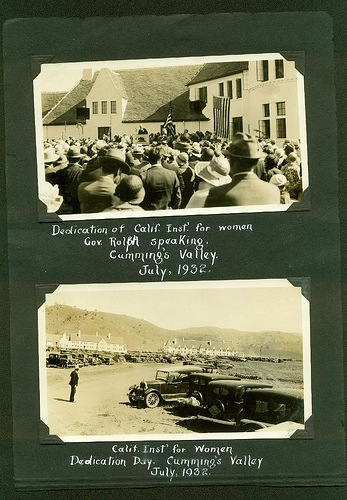
Burmah was denied parole a few times before she was discharged on December 1, 1941, just days before the attack on Pearl Harbor. She’d served less than eight years for her part in the 1933 crime spree. Upon her release, Burmah vanished from public view.
NEXT TIME: A Hollywood love triangle ends in death.

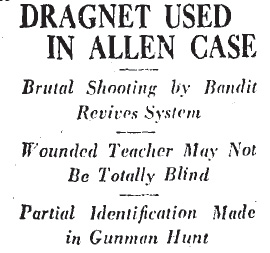
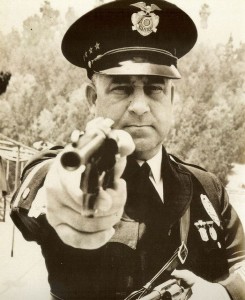
![Aggie Underwood interviews mourner at funeral of evangelist Aimee Semple Macpherson. [LAPL Photo]](https://derangedlacrimes.com/wp-content/uploads/2012/12/00034796-240x300.jpg)